#Alexander Beglov
Text
The Meaning of Easter: "The Rest Is Hell"
Alexander Beglov, the governor of St. Petersburg, congratulated all Orthodox Christians on yesterday’s Easter holiday during his weekly program on Radio Russia, wishing them peace and health.
“Easter is a symbol of the victory of life over death, light over darkness, good over evil. Today, our soldiers are defending by force of arms the ideals of goodness and justice, and protecting the…

View On WordPress
#Alexander Beglov#Mariupol#Orthodox Easter#Russian invasion of Ukraine#Russian nationalism#Smolny (Petersburg city hall)#Special Military Operation
1 note
·
View note
Text
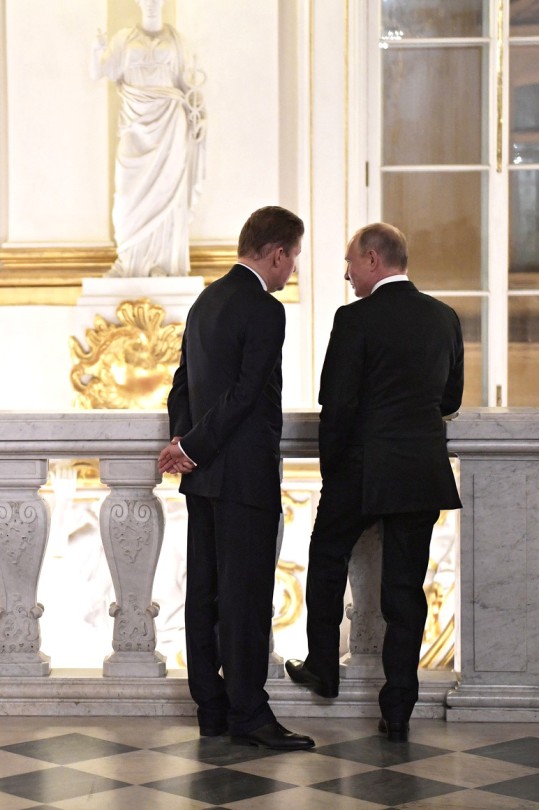
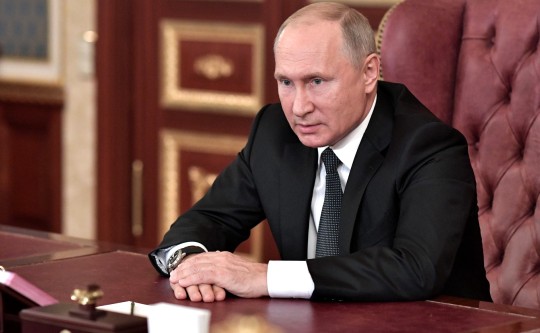
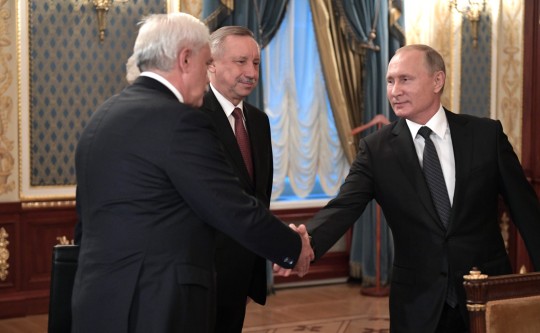
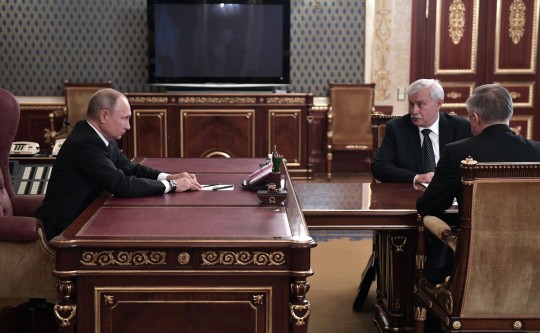

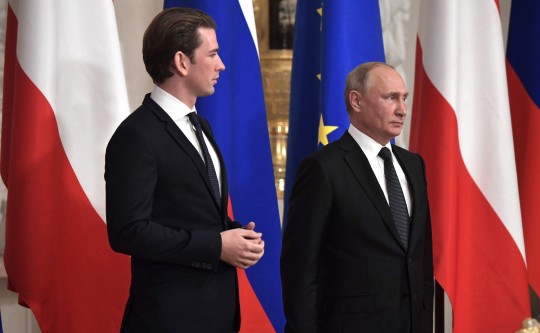

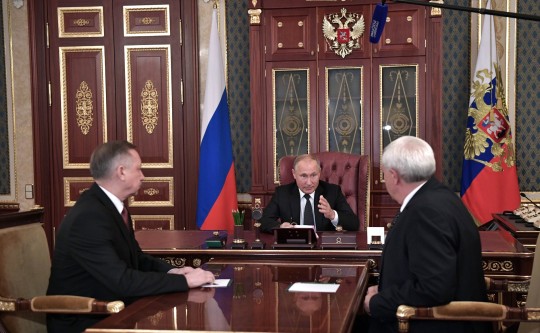
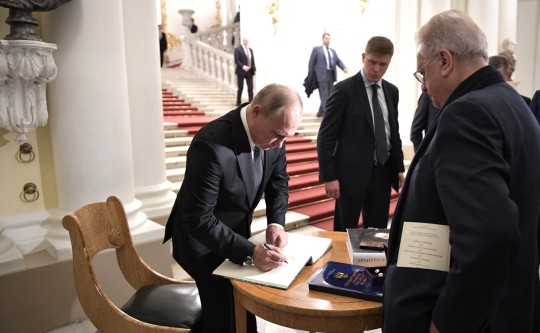
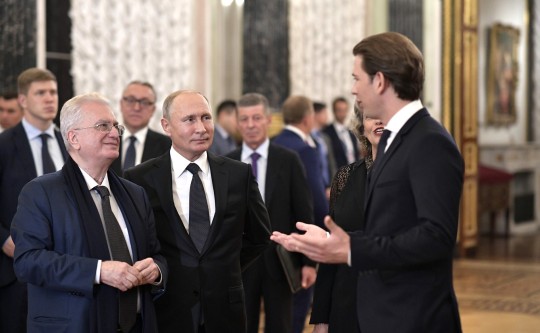
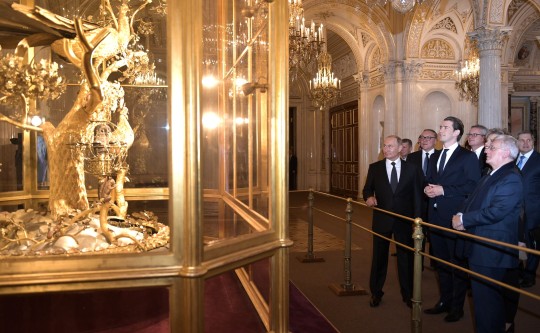
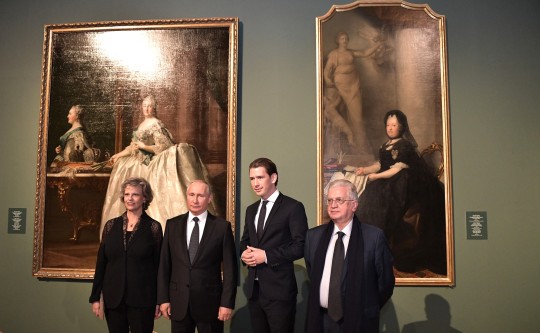
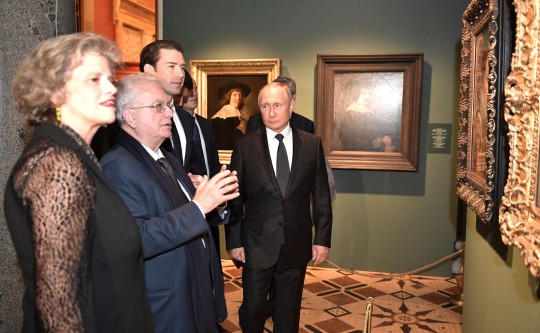
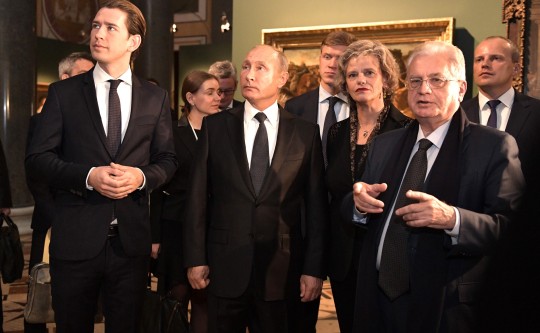

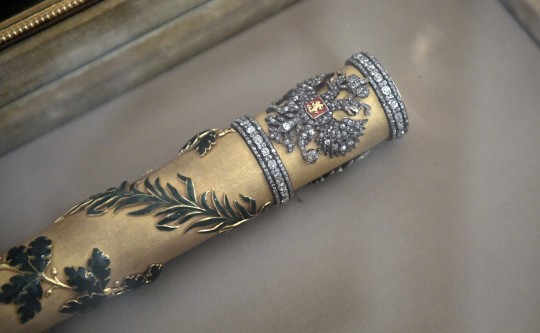
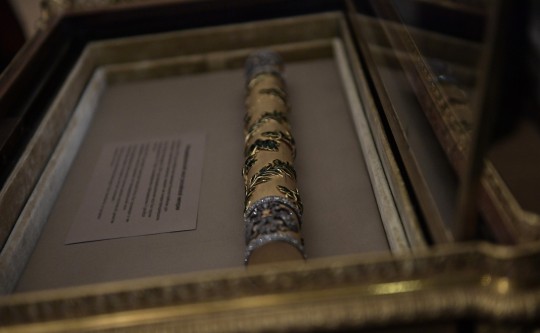


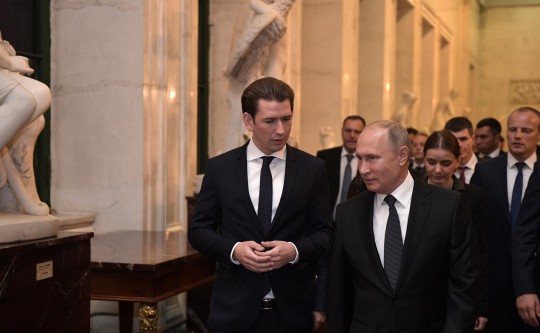

On October 3, 2018, Vladimir Putin had a working meeting with Georgy Poltavchenko and Alexander Beglov, during which he announced his decision to appoint Alexander Beglov Acting Governor of St Petersburg. He met with Gazprom CEO Alexei Miller after the talks with the Federal Chancellor of the Republic of Austria Sebastian Kurz. President of Russia Vladimir Putin and Federal Chancellor of Austria Sebastian Kurz visited the State Hermitage Museum, where they saw the Baton of the Field Marshal of the Russian Empire.
#vladimir vladimirovich putin#vladdy daddy#sebastian kurz#russian history#russia#saint petersburg#austria#Россия#Санкт-Петербург#Президент России Владимир Путин#gazprom
4 notes
·
View notes
Text
St. Petersburg Governor Alexander Beglov says that Russian soldiers have seen “gender-neutral bathrooms” in Ukrainian schools and therefore “understand very well what [Russia] is fighting for.”
“There’s no need to explain what values we’re defending to these guys who, instead of two bathrooms in schools (one for girls and one for boys), have seen three bathrooms: one for girls, one for boys, and one for gender-neutral people,” Beglov wrote on his Telegram channel after a visit with wounded Russian soldiers.
Beglov said he was deeply moved by the soldiers and they “understood [him] perfectly.”
2 notes
·
View notes
Text
Governor of Saint Petersburg Alexander Beglov demonstrated Vladimir Putin how manual electric generator works. Someone with admirable sense of humor added music from “Treasure Island” to the video.
youtube
6 notes
·
View notes
Photo

St. Petersburg Boosts Security Measures Amid Drone Strikes
St. Petersburg authorities on Monday announced strengthened security measures throughout the city after a drone crashed into an apartment building and exploded in Russia’s second-largest city over the weekend.
“I held an extended meeting with the heads of law enforcement agencies. We discussed issues of ensuring security in the region,” St. Petersburg Governor Alexander Beglov said on the Telegram messaging app.
Read more | Subscribe to our channel
0 notes
Text
St. Petersburg governor reports damaged buildings amid drone attack claims
Two buildings were damaged following an unspecified “incident” in St. Petersbug’s Krasnogvardeisky district early on March 2, the city’s governor, Alexander Beglov, reported. The governor’s statement Source : kyivindependent.com/st-peters…

0 notes
Link
0 notes
Text


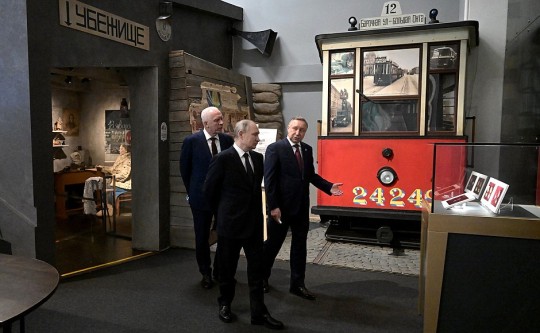
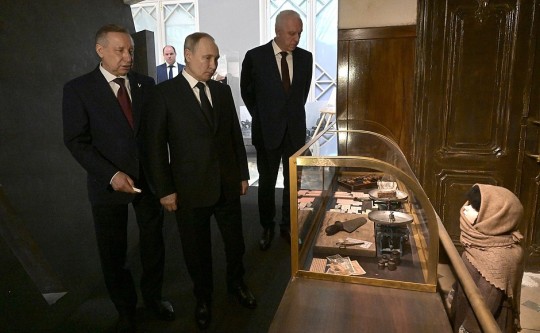
President Vladimir Putin toured the Spark of the Leningrad Victory exhibition in the company of Presidential Plenipotentiary Envoy to the Northwestern Federal District Alexander Gutsan and St Petersburg Governor Alexander Beglov.
(Source)
0 notes
Text
0 notes
Text
Wagner Group Founder Steps Up Feud With St. Petersburg Governor
Wagner Group Founder Steps Up Feud With St. Petersburg Governor
Yevgeny Prigozhin, the Kremlin-linked businessman and founder of the notorious Wagner Group, a shadowy mercenary organization, has upped the ante in his long-running spat with St. Petersburg Governor Alexander Beglov by requesting the Russian authorities investigate the politician for high treason.
The Wagner founder has made formal requests to both the Federal Security Service (FSB) and Russia’s…
View On WordPress
0 notes
Text
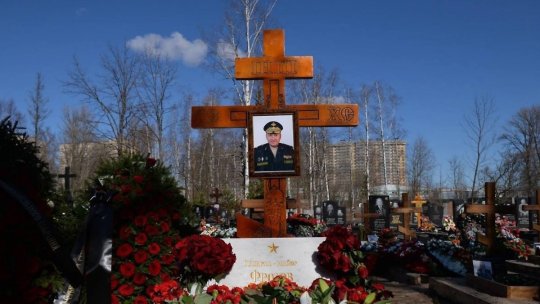
Kreml trauert um "wahren Helden" Weiterer russischer General in der Ukraine getötet
17.04.2022, 19:32 Uhr
Im Krieg gegen die Ukraine verliert Moskau einen weiteren Top-Offizier. Russland bestätigt den Tod des Generalmajors Frolow, in St. Petersburg wird er mit militärischen Ehren beigesetzt. Nach Kiews Angaben ist es bereits der achte russische General, der in der Ukraine getötet wurde.
Bei den Kämpfen in der Ukraine ist ein weiterer russischer General ums Leben gekommen. Generalmajor Wladimir Frolow, stellvertretender Befehlshaber der 8. Armee, wurde am Samstag in Sankt Petersburg mit militärischen Ehren beigesetzt, wie russische Staatsmedien berichteten. An der Trauerzeremonie nahm unter anderem der Gouverneur der Stadt, Alexander Beglov, teil. Beglov bezeichnete Frolow als einen "wahren Helden". Der General sei "eines tapferen Todes im Kampf mit ukrainischen Nationalisten" gestorben. "Er hat sein Leben geopfert, damit Kinder, Frauen und ältere Menschen im Donbass keine Bombenexplosionen mehr hören", sagte der Gouverneur laut einem Bericht der kremlnahen Zeitung "Komsomolskaja Prawda".
Unter welchen Umständen Frolow ums Leben kam, wurde nicht bekannt. Berichten zufolge war es die erste Beerdigung eines solch hochrangigen Militärs in St. Petersburg seit dem Beginn des Krieges am 24. Februar.
"Auf die richtige Art und Weise nach Hause zurückgekehrt"
Vor dem Einmarsch in die Ukraine war die 8. Armee in der Oblast Rostow im Süden Russlands stationiert. Der Kommandeur der Armee, Generalleutnant Andrej Mordwitschew, war nach ukrainischen Angaben am 18. März bei einem Luftangriff auf den Flugplatz Tschornobajiwka unweit der besetzten Stadt Cherson getötet worden. Russland bestätigte seinen Tod nicht. Ende März zeigte das russische Staatsfernsehen Bilder, auf denen angeblich zu sehen war, wie der Machthaber Tschetscheniens, Ramsan Kadyrow, in Mariupol mit Mordwitschew zusammentraf. Bei den Aufnahmen handelt es sich nach Angaben des Verifizierungsteams von ntv/RTL um Mordwitschew, der Zeitpunkt lässt sich jedoch nicht verifizieren.
Mehr zum Thema
Die Regierung in Kiew äußerte sich bislang nicht zum Tod Frolows. Die ukrainischen Streitkräfte teilten auf Twitter ein Foto des Grabes von Frolow und schrieben dazu: "Ein weiterer Okkupant ist auf die richtige Art und Weise nach Hause zurückgekehrt".
Ukrainische Medien berichten von nun insgesamt acht russischen Generälen, die seit dem Beginn des Krieges in der Ukraine getötet wurden. Russland bestätigte bislang nur den Tod des stellvertretenden Kommandeurs der 41. Armee, Andrei Suchowetzki. Wie auch im Fall Frolow gab es zum Ort und den Umständen seines Todes keine offiziellen Angaben.
0 notes
Text
Beglov: Russia Fighting in Ukraine to Eliminate Gender-Neutral Toilets
Governor Alexander Beglov (center), visiting wounded Russian soldiers at a military hospital in Petersburg. Source: Telegram
The Russian military understand well what they are fighting for in Ukraine because they have seen gender-neutral toilets in the local schools there, Petersburg Governor Alexander Beglov wrote on his Telegram channel after meeting with wounded soldiers at a hospital.
“It is…

View On WordPress
#Alexander Beglov#Boris Vishnevsky#gender neutral#gender-neutral bathrooms#Russian invasion of Ukraine
0 notes
Text
Moskow -
Kota terbesar kedua di Rusia, St. Petersburg, menyampaikan berita duka. Seorang jenderal Rusia dilaporkan tewas dalam pertempuran di Ukraina.
Dilansir CNN, Minggu (17/4/2022), kota itu menyatakan belasungkawa atas wakil komandan Angkatan Darat ke-8 Rusia, Mayor Jenderal Vladimir Frolov, yang meninggal di Ukraina minggu ini. Hal itu diungkap oleh kantor pers wali kota dalam sebuah pernyataan.
Baca juga: Rudal Jelajah Rusia Hantam Kharkiv Ukraina, 2 Orang Tewas-18 Terluka
Wali Kota St. Petersburg Alexander Beglov menghadiri pemakaman di Pemakaman Serafimovskoe yang bersejarah pada hari Sabtu waktu setempat.
"Hari ini kami mengucapkan selamat tinggal kepada pahlawan sejati," kata Beglov dalam pernyataan itu.
"Vladimir Petrovich Frolov meninggal secara heroik dalam pertempuran dengan nasionalis Ukraina. Dia mengorbankan hidupnya agar anak-anak, wanita dan orang tua di Donbas tidak lagi mendengar ledakan bom," katanya.
"Mereka berhenti menunggu kematian dan meninggalkan rumah, mengucapkan selamat tinggal seolah-olah itu untuk terakhir kalinya," sebutnya.
CNN tidak dapat mengkonfirmasi keadaan kematian Frolov. Beberapa perwira tinggi Rusia telah tewas di Ukraina.
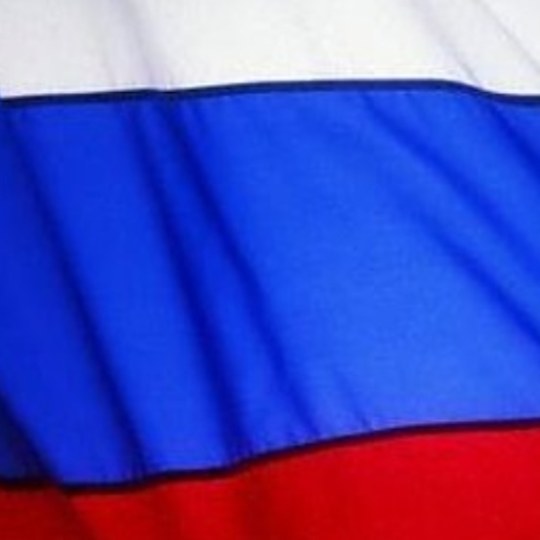
0 notes
Text
The question of how Russian elites are responding to further developments in the Russia-Ukraine war has become one of the most discussed issues in Russian and Western media. That’s understandable: While ordinary Russians remain relatively conformist and show no signs of politicization—despite the unpopular mobilization—there have been some hopes that the elites could perhaps play a role in restraining Russian President Vladimir Putin from further escalation. Or, at least, that they would become a factor Putin would have to take into consideration when making his decisions. The debate over whether Russian elites are split or not has been intensifying against the backdrop of unprecedented internal conflicts questioning Russian tactics in Ukraine. So, are the elites a threat to Putin? And how might possible further military failures impact the mood among the elites?
When it comes to the war in Ukraine, what is important is whether the splits concern Putin and his decisions. Putin’s regime is well known for its inter-elite fighting; indeed, that is its natural state. Security officials, or siloviki, clash with other siloviki (the FSB vs. the Federal Protective Service, the military intelligence service vs. the FSB); some of Putin’s friends with others (businessman and mercenary boss Yevgeny Prigozhin vs. St. Peterburg Gov. Alexander Beglov); senior officials with other officials (domestic policy overseer Sergei Kiriyenko has long been embroiled in a confrontation with his predecessor, State Duma speaker Vyacheslav Volodin); and so on.
But while the Russian elite is deeply divided, there has been no sign of any attempt to turn against Putin. The Russian elite may also be deeply divided over domestic decisions, be it social policy (the ruling United Russia party vs. the cabinet), energy topics (Rosneft vs. Gazprom), or domestic affairs (domestic policy overseers vs. the siloviki). But there have been no signs, at least publicly, of divisions over Putin’s decision to launch the war. Make no mistake, a significant part of the Russian elite considers the war a catastrophe. Some view it as a lesser evil but nonetheless an evil; some regret it, and still others have considerable doubts over the way Putin is conducting the campaign. But no one dared to act—until now.
Putin’s decision to launch the war came as a massive shock to the elites, who were not consulted and received no advance notice. Despite this initial shock, the elites rallied around Putin but with very different motives. Some, such as the technocrats (including Prime Minister Mikhail Mishustin, Moscow Mayor Sergei Sobyanin, and central bank head Elvira Nabiullina) opted to submit entirely: the easiest and safest strategy to survive. Others, rather pragmatically, have reinvented themselves as members of the party of war (such as former Prime Minister Dmitry Medvedev and United Russia head Andrey Turchak) to gain political weight and secure their political future. The third and final strategy is to genuinely back the war in its harshest and bloodiest form, to get involved in it, and bring Putin his victory. Before September, when Ukraine launched its unexpected counterattack, the nature of the elite’s support for Putin did not really matter. Whatever the grounds, the results were the same: People stood by their president because it was the safest way to survive. After September, that started to change.
Last month, the prospect of Russia losing the war began to loom, impacting every layer of the Russian elite, whatever adaptation strategy they had opted for. The mobilization and the annexation of four Ukrainian regions brought temporary relief, creating a sense that Putin had finally woken up and started listening to more sensible and sober figures in his entourage, pushing the president to act more decisively. But that relief did not last long. Ukraine’s army has continued to advance, the bridge connecting Russia and Crimea was blown up, Russian troops are exhausted and thin on the ground, the mobilization is faltering, and people are resisting. The overall situation seems, again, very bad, while Putin appears inappropriately and overly optimistic, which scares people. The massive missile strike against Ukrainian cities, positioned as a response to the Crimean bridge attack, achieved little, while concerns over a shortage of Russian missiles have been mounting.
What options does Russia have now? Can it prevent further Ukrainian counterattacks? Will it be able to secure control over the annexed regions? What is Moscow’s Plan C, since Plan A and Plan B have failed? Dishearteningly for many in the Russian leadership, Putin’s statements during his press conference in Astana, Kazakhstan, on Oct. 14 imply that Moscow is returning to its previous “wait and see” tactics: Moscow does not have the resources to advance, remains limited in its capability to carry out massive missile strikes, and can only count on freezing the situation, hoping to gain some time to regroup its forces. But will it have that time? And what happens if Kyiv continues to launch counterattacks? The absence of clear answers is shattering any unity among the elites and pushing them to look for better survival strategies: After all, no one wants to end up on the wrong side of history.
The lack of clear vision of how Russia can win has sparked tectonic shifts among Russian elites, who are now seeking ways to adapt to the deteriorating situation. For the first time ever, we may see an important part of the elite daring to intrude in Putin’s decision-making and imposing on the Kremlin its own vision of how the war should unfold.
Recent weeks have seen an unprecedented rise of elite indignation over how the war is progressing. Prigozhin, aligned with Chechen leader Ramzan Kadyrov and with public support from popular military bloggers on Telegram, has directed invectives at the Defense Ministry and General Staff, for the first time ever blaming Col. Gen. Aleksandr Lapin and Chief of the General Staff Valery Gerasimov for the military failures in Ukraine. Margarita Simonyan, the editor in chief of the state-controlled media outlet RT, has become one of the most prominent hawks. She has demanded a massive strike against Ukraine’s decision-making centers and dared to criticize the Defense Ministry. TV pundits are now going against the military. Even State Duma deputies who were until recently close to the Defense Ministry—former Deputy Defense Minister Andrey Kartapolov, now the head of the lower chamber’s defense committee, and former military commander Andrey Gurulyov—have joined the efforts, demanding that the prosecutor general investigate corruption in the army. In other words, the pro-war camp has set its sights on the Defense Ministry and army leadership, relying on support from state TV. All this has happened regardless of the fact that the military has been the key institution on which Putin has relied in his war against Ukraine.
Russia’s retreat from the Kharkiv region and its extremely fragile positions in Kherson, combined with Putin’s indecisive and hesitant behavior, have created a vacuum of political leadership at a crucial moment in Russian history. Prigozhin and Kadyrov’s moves show that they believe they have the right to interfere and be listened to by the Kremlin, since they personally have sent men—Prigozhin’s mercenaries and Chechens loyal to Kadyrov—to the slaughter in Ukraine. The rebellion is a direct response by the most ambitious segment of the party of war to Putin’s apparent lack of decisiveness. In an attempt to prevent Russia from losing the war, this part of the elite has succeeded in reaching out to Putin and convincing him to shift tactics to take a more critical approach to the military top brass and even implement personnel reshuffles. (Sergei Surovikin, openly backed by Prigozhin, has been appointed commander of the “special military operation,” as Putin calls the invasion.) This time, instead of shaping the political reality, Putin must learn to listen to those proposing alternative proposals. The circumstances are starting to shape the president.
This has had the effect of a political domino. Putin’s tolerance of the camp targeting Defense Minister Sergei Shoigu has opened the floodgates for TV managers in the presidential administration to become bolder. These managers have dared to take a more critical stance, raising questions of whether the army is coping; United Russia’s deputies have ventured to lash out at the Defense Ministry, followed by the in-system opposition. All of this is taking place against the backdrop of the presidential administration ceding the initiative. Putin’s staff, traditionally viewed as a demiurge of Russian politics in these circumstances, has been forced to submit to trends it does not control. The presidential administration, whose influence is nothing compared with what it was in the 2000s, continues to shrink, transformed into a tool used incrementally by the hawks to meet their demands.
These days, an important part of the Russian elite—made up of Prigozhin, Simonyan and TV managers in general, Kadyrov, and, with some reservations, United Russia—has started to question the way Russia is fighting in Ukraine: Putin’s exclusive zone of responsibility. They are targeting the military leaders, and even if they are not turning against the president (and they will not yet), they want Putin to act differently in order to secure victory. This is an attempt to compensate for the absence of a discernible and convincing plan in Ukraine from Putin, as well as tangentially questioning the way Putin deals with the military threats.
So, what will happen if Putin sticks to his (at least publicly) hesitant positions? His recent statements suggest that he is still counting on Kyiv capitulating one day, believing that Russia only needs to buy more time, sporadically resorting to strikes in exceptional circumstances (like after the explosion on the Crimean bridge). His public messages suggest that he does not intend to fight the Ukrainian army but merely stop it from advancing and that he would rather opt to threaten the West with the use of nuclear weapons than try to conquer Ukraine’s territory using its own forces. The hope that this plan may all work out and bring Ukraine under Russian control seems profoundly mistaken and may lead to new retreats and losses. It may even mean a larger mobilization with severe political consequences.
If Russia loses, that will lead to a situation in which the circumstances will be stronger than Putin. These circumstances will inevitably further fuel anxiety and uncertainty among the elites. They will not, perhaps, turn against Putin but will have to either find a way to bypass him (to adapt the policy without him) or manipulate him by imposing uncontested options and defeating those on whom he relies. Putin, having failed to implement every part of his plan so far, has been becoming more dependent on those who invested in this war, who have become a part of this war, who justify it, push it, and lose their people in the fighting.
Having launched this war as a personal surprise project, Putin now finds himself in a situation in which he can no longer make decisions in isolation. It’s not so much how the elites can threaten Putin but how Putin’s own position will gradually weaken as his plans fail. Even as they remain pro-Putin, the elites are becoming bolder and more decisive.
5 notes
·
View notes
Text
NJ city removes Putin's name from 9/11 memorial
NJ city removes Putin’s name from 9/11 memorial
Russian President Vladimir Putin listens to St. Petersburg’s governor Alexander Beglov during their meeting in the Kremlin in Moscow, Russia, Tuesday, March 1, 2022. (Alexei Nikolsky, Sputnik, Kremlin Pool Photo via AP)
(The Hill) — A New Jersey city has covered up the name of Russian President Vladimir Putin on a 9/11 memorial and is making plans to permanently remove it following Russia’s…
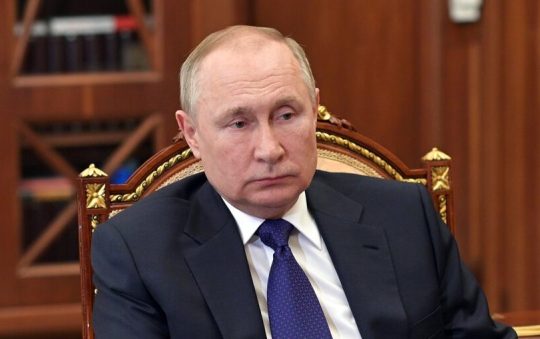
View On WordPress
0 notes
Text
0 notes